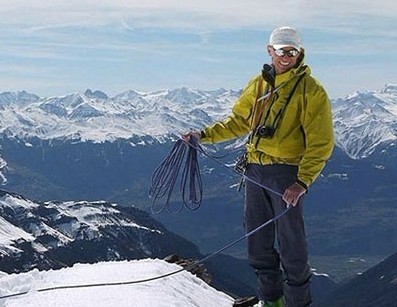(单词翻译:单击)
Roger Payne
罗杰·佩恩
Roger Payne, alpinist and avalanche expert, died on July 12th, aged 55
罗杰·佩恩,登山家,雪崩专家。7月13日遇难,年仅55岁。
MOST climbers simply chafe to reach the tops of mountains. Roger Payne was different. Although he had several first ascents to his name—Mount Grosvenor in China, Khan Tengri and Pobeda in Kazakhstan, in a career spanning 30 years—his priority was to go lightly, and leave no trace. His heroes were the alpinists of the early 20th century, George Mallory, Tom Longstaff, Freddie Chapman and the rest, who had climbed the world's greatest peaks in tweed jackets and leather boots. Like them, he went in a tiny team, often only with his wife, Julie-Ann Clyma, who was also a mountaineer. He took no oxygen, and avoided using fixed ropes. Every piece of rubbish or equipment was brought down off the mountain: not only his own, but also the tattered tents and empty cartons discarded by other people. In 1993, on K2, he also found and carried down the light, clean bones and ragged clothing of Art Gilkey, an American climber swept away by an avalanche in 1953.

大多数登山者爬到山顶的时候,身上都少不了各种绳带的勒痕。罗杰·佩恩(Roger Payne)却非如此。虽然他在30年的登山生涯中初次登过中国的格罗夫纳山,哈萨克斯坦的汗腾格里峰和托木尔峰——但他登山时优先考虑的是轻装上阵,不留踪迹。他心目中的英雄大都是20世纪初期的登山家,有乔治·马洛里(George Mallory)、汤姆·隆斯塔夫(Tom Longstaff)、弗雷迪·查普曼(Freddie Chapman)等人,他们都是仅靠一身花呢上装和一双皮靴就征服了众多世界高峰的人。和他们一样,罗杰·佩恩也是以小队形式登山,而且常常是他与妻子(朱利安·克里玛(Julie-Ann Clyma),也是一名登山者)只身二人出征。他不带氧气装置,也不用固定绳,而且还会把登山路上看到的垃圾和废弃的登山用具从山上带下来:除了自己的废弃物,他还会捡拾别人扔掉的破帐篷和被遗弃的空箱子盒子什么的。在他1993年攀登乔戈里峰(K2)的时候,他还发现并带回了美国登山者阿特·吉尔凯(Art Gilkey)(于1953年,死于雪崩)的遗物,包括几块较轻且干净的尸骨和一些破旧的衣物。
He went lightly and purposefully, but with great care. The mountains he loved so passionately were fickle, and demanded vigilance. Lithe and smiling, proud of his “boot-shaped” and blister-proof feet, he moved on exposed rock faces with the grace of a dancer and the fearlessness of a boy. He did things right: tents were dug in with proper snow-walls, supplies stored in well-marked snow-holes, attempts quickly abandoned if tiredness or bad weather struck. He would never push his luck on mountains, though he himself was never tired, leaping up from a schnapps-heavy evening to pull on his head-torch for a 1am start, and in booming cockney (“Are you climbing, or what?”) encouraging laggards onwards and upwards.
虽然他轻装上阵,目标明确,但也十分小心谨慎。他钟爱那些天气变化莫测需要他打起十二分精神来攀登的山。靠着他引以为傲的“靴子形”长满老茧的脚,只见肢体轻盈,面带笑容的他像一名舞者在裸露的岩石上移来跳去,像个孩子一般无所畏惧。无论是用雪球把帐篷支架敲入地里,把给养裹在有明细标记的雪洞里,还是在身感疲惫或遭遇恶劣天气时的快速全身而退,他总是把事情做得干净利落。他体力超人,既可以一夜之间摆脱醉醺醺的状态投入到凌晨一点攀登中去,又可以鼓励士气,激励那些来自伦敦东区的懒汉继续前行(比如会质问他们:你是来登山的,还是干什么的?)。但即便如此,他也从不对爬山心存侥幸。
As he went, despite the stream of merry chatter about the relative merits of waterproof fabrics, or the perfect pH of beer, he was on the watch. For snow that was fresh and powdery, or piled into a cornice; for slopes that were too steep; for debris of fallen rocks, or the mid-morning heat of the sun. All these were omens of avalanches. He was expert on them, teaching climbers and students—especially in the Alps, where he lived later on—to recognise the warning signs, and developing a safety code that came to be used across Europe.
尽管他生前开过许多关于防水织物相对优点,啤酒最佳酸碱度的玩笑,但他走后还是守望着这些大山。雪呈现粉状并且看起来像是刚下不久的样子,或者呈堆积起的雪檐状;山坡极度陡峭;有坠落的岩石碎片或者上午10时光热强烈。以上几点都是雪崩的前兆。他是这方面的专家,并且生前教登山者和学生们,尤其是住在阿尔卑斯山(他后来居住的地方)附近的人们如何识别这些前兆,并且他们的理论已经写进了欧洲登山者的安全守则。
He knew avalanches at close quarters—at times, way too close. On Pumari Chhish in Pakistan in 1999 he and Julie-Ann had spent five nights trapped on an icefield, with avalanches breaking over their tent. On Nanda Devi East in 1994 they had to descend an avalanche, and just made it; but he had taken the precaution of appeasing the mountain gods with a prayer-flag planted at the summit. Like the Romantic poets (like Byron's Childe Harold, which he would quote in reams, word-perfect, as he climbed), he believed that mountains were sublime. He had a special love for the compactness of Sikkim, squeezed between Tibet and India, whose elegant, shining peaks he helped open again to mountaineering. A camera went with him always, strapped tight against his sternum, to record for others the beauty he saw. But some of his favourite quotations weighed up the beauty against the risk.
他曾经近距离经历过雪崩——并且有几次离雪崩太近。1999年,在一次他与妻子攀登普马里基仕峰(位于巴基斯坦境内)的过程中被雪崩埋住了帐篷,夫妻二人被困在一块冰原上度过了5个夜晚。1994年在攀登楠达德维峰的时候他们不得不从一处刚经历雪崩的地方下山,最后他们死里逃生。但之前他已经采取了预防措施,就是用一幅插在山顶的祈祷旗来抚慰山神。像浪漫主义诗人(比如,他常常在登山的时候大量诵读拜伦《恰尔德·哈洛尔德游记》中的句子,并且一字不差)一样,他也认为山是庄严的。他对挤在中印边境上的锡金邦的紧致情有独钟。在他的努力下,得以让此地优雅而又闪耀着光芒的山峰重新对登山者开放。登山的时候,他习惯把相机紧紧地绑在胸前,以便分享他眼前看到的美景。但他最喜欢引用的一些句子都对美景和其背后的风险做了权衡。
Diplomacy at 7,000 metres
在海拔7000米的地方搞外交
Down at sea-level, he was a tireless organiser. Everything to do with mountains demanded his attention and his infectious energy. He didn't belong behind a desk, and at Sunderland Poly, where he took a teaching degree in 1983, he bunked off lectures to go climbing. But if he had to protect and promote the peaks by doing paperwork, he would.
下山之后,他变身一个不知疲倦的组织者。他会用他那富有感染力的热情认真处理任何与山有关的事情。他不是那种坐办公室的料,虽然1983年他在桑德兰理工学院取得了教育学学位,但随后丢掉讲师之职去登山了。但如果必须通过写文书来保护并推广各大山峰,他还是会去写点什么的。
For 12 years he took charge at the British Mountaineering Council, swelling both membership and revenues, arranging competitions and writing memos late and long, until he would bolt from the Manchester office to scale the nearest crags. He brought mountaineering to schoolchildren (remembering how he had discovered it in the Scouts in Hammersmith), and to the disabled. He also took his expertise abroad, teaching young Iranians to climb and Sikkimese to become guides like himself; and he became a diplomat of the Greater Ranges, urging Indian and Pakistani climbers to forget their countries' long rivalry over the Siachen glacier.
他还主持了12年的英国登山协会,期间主要负责扩充会员,提高收入,安排赛事并写一些备忘录。该职一直持续到他忍不住从新投入到登山生涯中去。他还让小学生(要知道他是如何在汉默史密斯的童子军中接触到登山的)和残疾人有机会参与到登山运动中去。他还到国外传授专业登山知识,比如教伊朗的年轻人如何爬山,教锡金邦的人如果成为像他一样的向导;并且他还成了一名亚洲各大高山之间外交官,呼吁印巴登山者忘掉在锡阿琴冰川上的长期对峙。
The people of the mountains he remembered, too. On his ascent of K2 he took a pair of micro-hydroelectric systems to give non-smoky light and heat to two remote villages. This made the trip for him, though he never reached the top. He kept a watch on how climate change was affecting both the Himalayas and the Alps. But he never wanted to be part of any large and overstuffed expedition. Nor did he seek out the celebrity peaks, or brag about “conquering” the unsung 6,000-7,000-metre peaks he preferred.
此外,他还不忘山上的人们,也给他们带去了福祉。在他征服乔戈里峰(K2)的时候,他给两处偏远的村庄带去了一对微型水利发电系统,该系统可用于无烟照明和制热。虽然他从未到过乔戈里峰峰顶,但也没白跑一趟。他还留心观察气候变化对喜马拉雅山脉和阿尔卑斯山脉的影响。但他从未想过参与一次任何大型的装备精良的登山远征。他也不想涉足那些大众青睐的山峰,亦或是吹嘘自己征服了哪些六七千米的无名之山。
For that reason, he was not among the best-known mountaineers. The first many people had heard of him was when, in early July, an avalanche caused by a toppling ice-block swept him away, with eight others, on Mont Maudit, beside Mont Blanc. He was guiding two clients along a popular route; the way and the weather looked safe. He was travelling light, on what he liked to call “another day in the office”. As no one knew better than himself, there was no perfect safety in mountains. But he would not have been in any other place, for, in Byron's words, “Where rose the mountains, there to him were friends”.
正因如此,他并未进入最著名的登山者之列。人们初次听到他的名字或许是这样的:7月初,一场发生在穆迪峰上(位于勃朗峰附近)的一场雪崩夺去了他和另外8名同伴的生命。该雪崩由一块断裂的方冰引发。当时他正在引导两个客户沿一条众人常走的路线行进;无论是道路还是天气看起来都没有安全隐患。那天他轻装上阵,用他的话说就是“跟在办公室里穿得差不多”。但他最清楚在山区是没有绝对安全可谈的。但他不想离开大山去别的地方,用拜伦的一句诗来说就是“山之所起,友之所在”。


